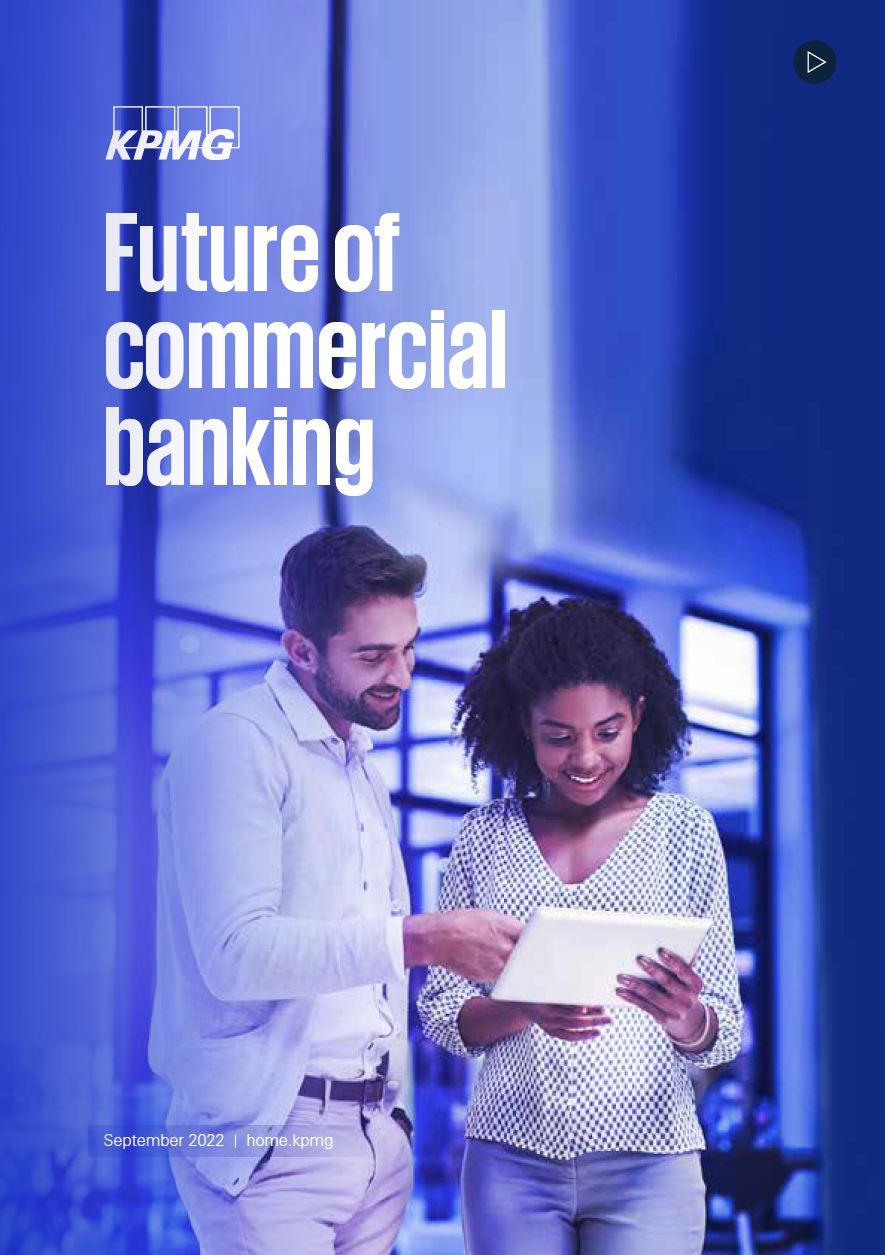The commercial banking industry is rapidly evolving through digitization, increased competition and tighter regulation. Commercial banks serving small and medium-sized businesses are transforming to compete. So, what will the future commercial banking landscape look like and what should commercial banks do to stay competitive?
In our latest report, KPMG surveyed over 400 commercial banking leaders from around the world, who are involved with customer-centric strategy and enablement decisions. We identified key signals of change taking place across the industry, alongside what we believe will be the three dominant future business models in the new reality. To survive and grow in this new reality, commercial bankers should consider how a connected approach, underpinned by technology to support the front, middle and back office, will enable true value from digital transformation.
Signals of change
Commercial banking faces a more complex environment than perhaps ever before. Changes across the industry are forcing banks to review their growth strategy and innovate to remain relevant against client demands, rapid enhancement in digital capabilities, digitization and new sources of competition.

Future of commercial banking
Discover the latest insights and trends that are shaping the commercial banking industry
Download PDF (0.5 MB) ⤓
01
Re-imagined digital commercial bank
These banks will transform into fully connected digital banks, leveraging capital and data, while commercializing traditional cost centers through the re-bundling of services to offer a full range of hybrid value propositions and banking services to generate new income streams.
02
Banking-as-a-Service
Banking-as-a-Service (BaaS) providers will develop and license services and products and manage user interfaces to provide commercial banking services to end users, through intermediary partners. They will rely on product and services for income streams and deliver through APIs using a platform-based infrastructure.
03
Platform provider
The platform provider develops infrastructure to enable the commercial banking ecosystem, by providing, maintaining or policing a banking platform or ecosystem with either open or closed access, for its own and others’ purposes. The platform is a gateway to any number of services and clients, and the technological infrastructure is the main source of income.
KPMG Connected Enterprise
Approaching change means adapting to a connected operating model. The KPMG Connected Enterprise approach is designed to help commercial banking organizations assess their existing capabilities, identify capability gaps, and manage the transformation hurdles across the enterprise to design and embrace their future business models.
Eight capabilities, twice as likely to succeed
The eight capabilities of the KPMG Connected Enterprise deliver tools, methods and frameworks to achieve a new, better business-as-usual with agility and accelerated innovation.
These capabilities help banking organizations define a customer-centric approach to digital transformation that connects the front, middle and back offices, which will be of critical importance to navigate the future commercial banking landscape.
Base: 1,299 professionals involved with customer-centric strategy decisions
Source: A commissioned study conducted by Forrester Consulting on behalf of KPMG, September 2018.
- 2xImpact
Our approach
Our approach is centered on enhancing all eight connected capabilities across the enterprise to the level that can provide the greatest value. These connected capabilities map to the operating model of a bank and can allow you to prioritize, shape and execute your digital transformation.
KPMG professionals help commercial banks evaluate their maturity across these connected capabilities, shape their transformation agenda and plans, and deploy improvements in the capabilities across the enterprise with the aim of providing the greatest value.
With the consumer at the core, there are five critical questions that commercial banks should ask themselves:
Are you connecting your clients/brokers with compelling value propositions, opportunities,
and interactions?Are you connecting and empowering your employees to deliver on the client promise?
Are you connecting your front, middle and back offices to execute the client growth agenda?
Are you connecting your ecosystem of business partners to jointly deliver on commitments
to clients?Are you connecting to market dynamics and digital signals?
Connect with us
- Find office locations kpmg.findOfficeLocations
- kpmg.emailUs
- Social media @ KPMG kpmg.socialMedia
Why work with KPMG in Thailand
KPMG in Thailand, with more than 2,000 professionals offering Audit and Assurance, Legal, Tax, and Advisory services, is a member firm of the KPMG global organization of independent member firms affiliated with KPMG International Limited, a private English company limited by guarantee.
Throughout this page, “we”, “KPMG”, “us” and “our” refers to the global organization or to one or more of the member firms of KPMG International Limited (“KPMG International”), each of which is a separate legal entity.